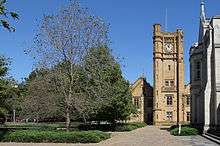Samuel Charles Brittingham
Samuel Charles Brittingham (1860-12 November 1944) was a British-born architect who worked extensively in Australia in the early twentieth century.
Samuel Charles Brittingham | |
|---|---|
| Born | 1 January 1860 |
| Died | 12 November 1944 (aged 84) Abbotsford, Victoria, Australia |
| Nationality | Australian |
| Occupation | Architect |
| Buildings | Burke St West Police Station, Parkville Post Office, Maryborough State High School, Box Hill Primary School, Old Arts Building, Horsham Base Hospital |
| Projects | Morwell Planning Scheme |
Early life and career
Brittingham was a pupil in the Victorian Education Department from 1875-9 and then remained as assistant 1879-85, before taking up a position with the Victorian Public Works Department in 1886.[1]
He passed the examination of the Royal Institute of British Architects in London on 9 November 1906,[2] although he appears to have sat it in Melbourne at the time.

He became Victorian Government Architect and was responsible for a number of prominent public buildings in Victoria including the Old Arts Building at Melbourne University, 1919–24,[3] Parkville Post Office,[4] and Bourke St West Police Station[5] as well as a number of other public buildings.
As government architect he was responsible for the first buildings in national parks, including the rangers house (1909) and visors' Chalet (1923) at Wilsons Promontory National Park. It is likely he also designed the Mount Buffalo Chalet.
In 1918 Brittingham proposed a scheme to alleviate Melbourne's traffic congestion by constructing a bridge to extend Exhibition Street across the Jolimont railway yards[6] anticipating the present Exhibitions Street extension by 80 years. He later attended own planning conferences and was instrumental in the new planning scheme devised for the Morwell coal fields.
Family
His parents were William and Ann Amelia Brittingham[7]
siblings – Walter Edgar BRITTINGHAM. died 14 Feb 1945 (6th son) Elizabeth, Rachel, May, and Alfred Furkess.
wife – Mrs. Lily Edith Brittlngham, died at home in Chrystobel crescent Hawthorn around 2 June 1937[8]
two sons – Dr. L. C. Brittingham, of East St. Kilda, and Mr. G. J. Brittingham, of Port Kembla.
Brittingham died on 12 November 1944 at his home in Chrystobel crescent Hawthorn, aged 84. For 47 years he was associated with the public service and was a trustee of the Methodist Church, Oxley Road, Auburn. He was buried at Kew Cemetery.[9]
Awards and membership
Associate of the Royal Institute of British Architects 10 June 1907 proposed by G C Inskip, W A Pite, E A Gruning.[10]
RIBA nomination papers A v17 p102
Works
- Morwell Town Planning Scheme.[11]
- Old Burke St West Police Station (with S.E. Bindley) 1887-9 [12]
- Parkville Post Office and Quarters (with S.E. Brindley) 1889 [13]
- Central Telephone Exchange, Melbourne 1907-9
- Mount Buffalo Chalet, 1910 – probably designed by Brittingham – he inspected the site in 1924 in regards extensions.[14]
- Fairfield Primary School 1910 [15]
- Maryborough High School 1912 [16]
- The Box Hill Primary School 1919 [17]
- Women's VD Clinic 'Septic Clinic for Women' 372- 378 Little Lonsdale Street 1919 [18]
- Old Arts Building (Melbourne University) 1921 [19]
- Horsham Base Hospital in 1926.[20]
References
- Directory of British Architects, 1834-1914: Vol. 1 (A-K) by Alison Felstead, Jonathan Franklin p.258
- "GENERAL CABLE NEWS". The Register. Adelaide: National Library of Australia. 10 November 1906. p. 7. Retrieved 27 August 2012.
- Walking Melbourne
- Victorian Heritage Register H1167
- Victorian Heritage Register H0655
- "MELBOURNE STREET TRAFFIC". The Advertiser. Adelaide: National Library of Australia. 31 May 1918. p. 7. Retrieved 27 August 2012.
- "Family Notices". The Argus. Melbourne: National Library of Australia. 16 February 1945. p. 2. Retrieved 27 August 2012.
- "OBITUARY". The Argus. Melbourne: National Library of Australia. 5 June 1937. p. 15. Retrieved 27 August 2012.
- "MR GEORGE H. THOMAS". The Argus. Melbourne: National Library of Australia. 13 November 1944. p. 5. Retrieved 27 August 2012.
- Directory of British Architects, 1834-1914: Vol. 1 (A-K) by Alison Felstead, Jonathan Franklin p.258
- "MORWELL ELECTRIC SCHEME". Morwell Advertiser. Morwell, Vic.: National Library of Australia. 9 July 1920. p. 3. Retrieved 27 August 2012.
- Walking Melbourne
- Onmydoorstep
- 'Mount Buffalo' The Argus 25 November 1921 p.12, accessed 27 August 2012 National Library of Australia
- Context Pty Ltd, May 2010, City of Darebin, Heritage Study additional Stage 2 place assessments
- Victorian Heritage Register H2143
- National Trust Register B6691
- Historic monument to Women's Heath and World War I under threat Archived 11 April 2013 at the Wayback Machine
- Victorian Heritage Register H924
- "THE BASE HOSPITAL". The Horsham Times. Vic.: National Library of Australia. 26 March 1926. p. 4. Retrieved 27 August 2012.